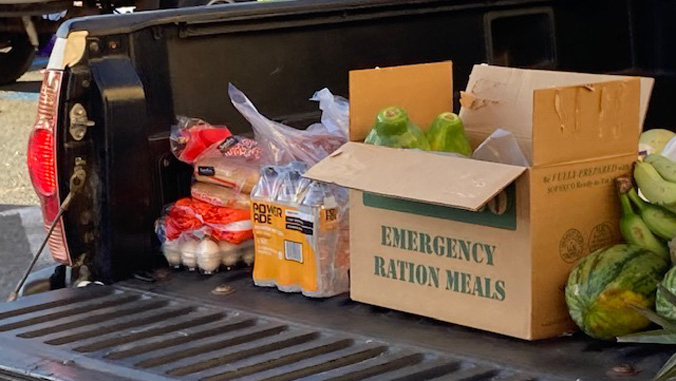
Food insecurity is a key driver of poor mental health in Hawaiʻi, according to a new study by University of Hawaiʻi at Mānoa researchers.
Published February 23, in Frontiers in Public Health , the study analyzed data from 2,270 adults residing in Hawaiʻi, collected in 2022, to assess the impact of socioeconomic and demographic factors on mental health. Nearly 40% of participants reported symptoms of depression, 15% experienced low self-esteem and 4.2% had thoughts of suicide. Among the most significant predictors of poor mental health was food insecurity, which disproportionately affected individuals with pre-existing health conditions.
"These results highlight the critical role food security plays in shaping mental health outcomes," said Ruben Juarez, paper co-lead and UH Economic Research Organization (UHERO)-HMSA Professor in Health Economics. "Addressing food insecurity isn't just about nutrition—it's about safeguarding mental well-being and improving overall community resilience."
Additional findings showed that employment and positive perceptions of community safety helped mitigate the risk of depression. Those with stable employment were 2.8% less likely to experience depression, while individuals who felt their communities were safe during the COVID-19 pandemic saw a 9.9% reduction in depression risk.
Urgent needs: food assistance, economic security, trust in community
This study provides the most comprehensive analysis to date of the determinants of mental health—specifically depression, low self-esteem and suicidal ideation—among adults in Hawaiʻi. The research, co-led by Juarez and Binh Le, a postdoctoral researcher at UHERO, and a team of researchers at UHERO and the John A. Burns School of Medicine underscores an urgent need for Hawaiʻi policymakers, healthcare providers and community organizations to expand food assistance programs, strengthen economic security and foster trust in community safety measures.
"This study provides clear evidence that improving food security along with other socioeconomic factors must be a public health priority," said Juarez. "By addressing these underlying economic and social factors, we can take meaningful steps toward reducing mental health disparities in Hawaiʻi."
The study, Socioeconomic Determinants of Mental Health Outcomes Among Hawaii Adults, is available online . Other authors on the paper are Daniela Bond-Smith, Carl Bonham, Lisa Sanchez-Johnsen and Alika K. Maunakea.
UHERO is housed in UH Mānoa's College of Social Sciences .
Related UH News stories:
- UH students help feed hungry families, recover excess food , November 26, 2024
- Hawaiʻi CC feeds hungry families, grows future farmers , May 5, 2024
- Free, fresh produce for UH West Oʻahu students , October 10, 2023
- Basic needs insecurity, available resources highlighted in new video , July 19, 2022
- UH students have new web resource for basic needs , March 1, 2021
The post Food insecurity a major driver of mental health challenges, study finds first appeared on University of Hawaiʻi System News .






